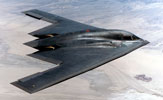
The appointment of retired Air Force General Scott Gration as Special Envoy to Sudan, as John Norris notes, means that someone who actually knows what he is talking about will be at the center of the debate about the potential role of air power in responding to the crisis in Sudan. Ever since General Merrill A. McPeak and Kurt Bassuener revisited the prospect of a no-fly zone in the Washington Post, debate within the blogosphere on the prospect of a no-fly zone or other measures to interdict Sudan’s bombing of civilian targets has heated up:
- Diane Marie Amman of IntLawGrrls and Kevin John Heller of Opinio Juris have joined the debate on the legality of air strikes, particularly in relation to the U.N. charter.
- Mark Leon Goldberg has a good rundown of the legal debate on air strikes, but concludes by noting a lack of "any serious discussion of the strategic purpose of a U.S.-led bombing campaign in Sudan."
- Although Nick Kristof has taken a fair amount of heat in the blogosphere for his comments on air strikes, he has made some fairly compelling points on this subject. In particular:
“Sudan cares deeply about maintaining its air force, partly because it is preparing for renewed war against South Sudan. That means that a denial of air cover or the loss of helicopter gunships would deeply alarm Sudan’s military, and that gives us leverage.”
- Chris Albon at War and Health supports the idea of a no-fly zone, but notes that the track record of the Iraq no-fly zone is mixed. Apparently Saddam was able to switch from fixed wing aircraft first to helicopters and then to artillery bombardment to get around the prohibitions.
- David Axe of War is Boring looks at some nuts-and-bolts operational considerations and critiques Albon’s view, noting that F-22 stealth fighters would be particularly vulnerable to the region’s sandstorms.

